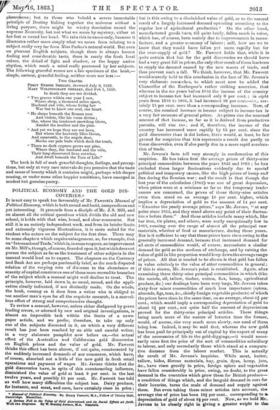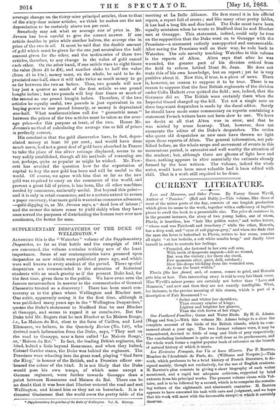POLITICAL ECONOMY AND THE GOLD DIS- COVERIES.* IT is not
easy to speak too favourably of Mr. Fawcett's Manual of Political Economy, which is both sound and lucid, compendious and yet interesting. It proceeds from a disciple of Mr. J.S. Mill, and on almost all the critical questions which divide the old and new school, it holds with that wise, broad, and clear economist. But still it is an entirely independent work, and from its briefer limits and extremely vigorous illustrations, it is more suited for the student who enters on the subject for the first time. There may be some chapters which require enlargement, as, for example, that on "International Trade,"which is, in some respects, an improvement on Mr. Mill's, though, of course, founded upon it, butwhich does not pursue the subject as far as the treatment of other subjects in the manual would lead us to expect. The chapters on the Currency and Bank Act are perhaps pardonably brief, as the much disputed relation of the varying rate of discount to the abundance or scarcity of capital constitutes one of those more recondite branches of the subject which a manual might well decline to treat. The principle, however, laid down is, as usual, sound, and the appli- cation clearly indicated, if not distinctly made. On the whole, the book, coming as it does from a writer who is obliged to use another man's eyes for all the requisite research, is a marvel- lous effort of strong and comprehensive thought.
To review a manual, however, unless either disfigured by grave leading errors, or adorned by new and original investigations, is almost an impossible task within the limits of a news- paper article, and we prefer, therefore, to take up only one of the subjects discussed in it, on which a very different result has just been reached by an able and careful writer, in a very elaborate pamphlet now before us,—the actual effect of the Australian and Californian gold discoveries on English prices and the value of gold. Mr. Fawcett thinks this effect has been almost, if not quite, counteracted by the suddenly increased demands of our commerce, which have, of course, absorbed not a little of the new gold in fresh retail operations and payment of wages. Mr. Jevons thinks that the gold discoveries have, in spite of this counteracting influence, diminished the value of gold at least 9 per cent. in the last twelve years, and possibly 15 per cent. Mr. Fawcett has told us well how many difficulties the subject has. Dairy produce, for instance, and meat, and corn, have certainly risen in price ;
* Manual of Political Economy. By Henry Fawcett, M.A., Fellow of Trinity Han, Cambridge. Macmillan.
A Serious Pall in the Value of Cold Ascertained, and its Social Vedas set forth. With two diagrams. By W. Stanley Jevons, M.A. Stanford. but is this owing to a diminished value of gold, or to the natural result of a largely increased demand operating according to the regular law of agricultural production ? On the other hand, manufactured goods have, till quite lately, fallen much in value, which has, of course, been mainly due to improvements in manu- facture, and a greater economy of labour ; still, how are we to know that they would have fallen yet more rapidly but for the over-supply of gold ? Mr. Fawcett holds that, while it is. quite certain that but for the gold discoveries we should have had a very great fall in prices, the only clear result of them has been to supply the demand caused by the new wants of trade, an thus prevent such a fall. We think, however, that Mr. Fawcett would scarcely hold to this conclusion in the face of Mr. Jevons'a very elaborate researches, to which must now be added the Chancellor of the Exchequer's rather striking assertion, that whereas in the ten years before 1852 the income of the country subject to income-tax had increased only 6 per cent.; in eight years from 1853 to 1861, it had increased 20 per cent.—i.e., cer- tainly 15 per cent. more than a corresponding increase. Now, of course, the nominal increase in income subject to income-tax is a very fair measure of general prices. As prices rise the nominal amount of that income, so far as it is derived from productive- pursuits, will rise too ; and if, therefore, the income of the- country has increased more rapidly by 15 per cent. since the gold discoveries than it did before, there would, at least, be fair ground for suspicion that this represents a result due partly to those discoveries, even if also partly due to a more rapid accelera-
tion of trade. •
Mr. Jevons's facts tell very strongly in confirmation of this- suspicion. He has taken first the average prices of thirty-nine principal commodities between the years 1845 and 1862 ; he has excluded those larger fluctuations evidently due to special' political and temporary causes, like the high prices of hemp and' flax during the Russian war ; and the result is that though the- last year of time calculation (1862) was one of great depression, when prices were at a minintum so far as the temporary trade- causes are concerned, the prices of those thirty-nine articles even then stood on an average 16 per cent. higher, which- implies a depreciation of gold to the amount of 14 per cent. "Examine the yearly average prices," says Mr. Jevons, "at any' point since 1852, and they stand above any point of their fluctua- tions before them." And these articles include many which, like bar iron, tin plates, and others, were really exceptionally low in- 1862, running over the range of almost all the principal raw materials, whether of food or manufacture, during these years._ Nor is it sufficient to say that these prices have risen owing to the generally increased demand, because that increased demand for all scats of commodities would, of course, necessitate a similar demand for gold as the medium of exchange, and by raising the value of gold in like proportion would keep down the average range of prices. All that is needed to be shown is that gold has fallen, in value relatively to the value of other commodities in general; if this is shown, Mr. Jevons's point is established. Again, after examining these thirty-nine principal commodities in which (like. the metals, oil, tallow, timber, cotton, flax, hemp, agricultural produce, &c.) our dealings have been very large, Mr. Jevons take& sixty-four minor commodities of much less importance (spices, almonds, figs, teas, &c., chiefly foreign vegetable products) of which the prices have risen in the same time, on an average, about 61 per cent., which would imply a corresponding depreciation of gold to, about Bi per cent., not quite half the amount of depreciatiora proved for the thirty-nine principal articles. These things. being much more of the nature of luxuries than the former, would, of course, rise very much more slowly, our need of them being less. Indeed, it may be said that, whereas the new gold. has been paid for principally out of capital by the export of many of the necessaries of life to the gold-diggings,—it would neces- sarily raise first the price of the sort of commodities subsidiary to labour, and only secondarily those which stand at a compara- tive distance from the labour market. This is actually the result of Mr. Jevons's inquiries. While meat, butter; tallow, hides, fibrous materials, hay, grain, dyes, hemp, jute, &e., have risen greatly in price, foreign spices and vegetables have fallen considerably in price, owing, no doubt, to the great demand in the countries which grow them for British produce— a Condition of things which, and the languid demand in ours for their luxuries, turns the scale of demand and supply against them. But even taking these minor articles into account, the average rise of price has been 10+ per cent., corresponding to as depreciation of gold of about 91 per cent. Now, as we bold Mr.. Jevons to be clearly right in giving a greater weight to the,
average change on the thirty-nine principal articles, than to that of the sixty-four minor articles, we think he makes out the net depreciation to be certainly above ten per cent.
Somebody may ask what an average rise of price is. Mr. Jevons has been careful to give the correct answer. If one -article doubles in price while another halves, the average rise in price of the two is nil. It must be said that the double amount 'of gold which must be given for the one just neutralizes the half- amount given for the other, and the testimonies of these two articles, therefore, to any change in the value of gold cancel each other. On the other hand, if one article rises to eight times the value (from .t1 to X8), and another sinks to half the value (from £1 to 10s.), money must, on the whole, be said to be de- preciated one-half, since it will take twice as much money to go as far between the two as before. Thus, two pounds will now buy just a quarter as much of the first article as one pound bought before ; but two pounds will buy four times as much of the second as one pound bought before. Therefore, if the two articles be equally useful, two pounds is just equivalent in its buying power to one pound formerly, or money is depreciated -one-half. What mathematicians call the " geometric mean" between the prices of the two articles must be taken as the aver- age price—for this purpose at least, of the two. Hence Mr. Jevons's method of calculating the average rise or fall of prices is perfectly correct.
His conclusion that the gold discoveries have, in fact, depre- 'clated money at least 10 per cent., and would have done much more, had not a great deal of gold been absorbed in France to take the place of the silver coinage displaced, seems to us very safely established, though all his methods of reasoning are not, perhaps, quite as popular as might be wished. Mr. Faw- cett has avoided the question how far the exportation of 'capital to buy the new gold has been and will be useful to the world. Of course, we agree with him that so far as the new gold was required to carry on the commerce of the world, and prevent a great fill of prices, it has been, like all other machines needed by commerce, eminently useful. But beyond this point— and it is only in retail con:mime, and to a certain extent to secure a paper currency, that more gold is wanted as commerce advances, —gold-digging is, as Mr. Jevons says, a" dead loss of labour ;" and the sooner the mines cease to yield richly when they have once served the purposes of distributing the human race over new continents, the better for man.































 Previous page
Previous page